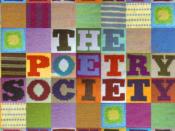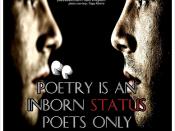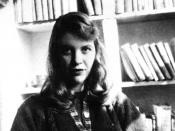The poem is about the power of words, though in this case a destructive power.
To me this is a very direct poem. Words are like axes, powerful and sharp, loud, emitting echoes, everyone can hear them, everyone can see their effect.
Words can be like axes, if they are used cruelly. They hurt. They drag her and wound her, bringing her to the surface sap, like tears, or like the blood-jet of poetry, trying to re-establish her own image, the mirror, her own sense of self. They cut into the tree which may symbolize a person, the sap which wells being tears. The tears are heavy like a rock and disturb the calm waters which try to return to normality.
The rings of the tree may be compared to how words affect us over and over again.
The mirror that is trying to re-establish itself seems to represent the effect harsh words have in breaking us up into pieces.
One might be hurt by words but the initial sting may last for quite some time.
Her life tries to return to normality. The tears grow old and covered in weeds, forgotten, but still there forever.
Later in life she encounters the words again, but now they are 'dry and riderless' they have no effect, they are old and worn. These words are sterile and powerless to do what she tries to make them to do. This is while her life is fixed, her destiny controlling her, waiting in the pool which may be the same one once disturbed by the rock, the weight of her tears and hurt. The stars represent her destiny. It never can be disturbed or changed by emotions.
The 'white skull eaten by weedy greens' represents her father's death.
In a larger sense the poem is about the impotence of words to resist one's fate.
In Plath's poems each word is like a stone dropped in a pond, the meanings and symbolism of words travelling out from them like ripples.
This sense of fatalism, the inevitability of her death is, in my opinion, a legacy she inherited from Ted Hughes. This poem encapsulates in it the whole task that she set for herself and her work, and, in spite of the triumph of her poetic accomplishment, the ultimate failure of that task.






